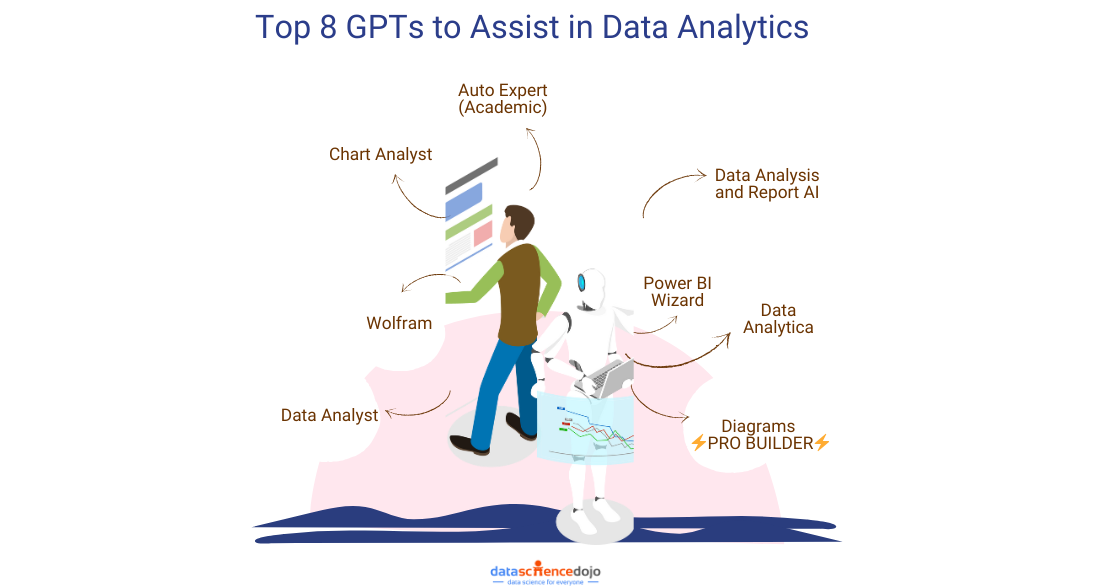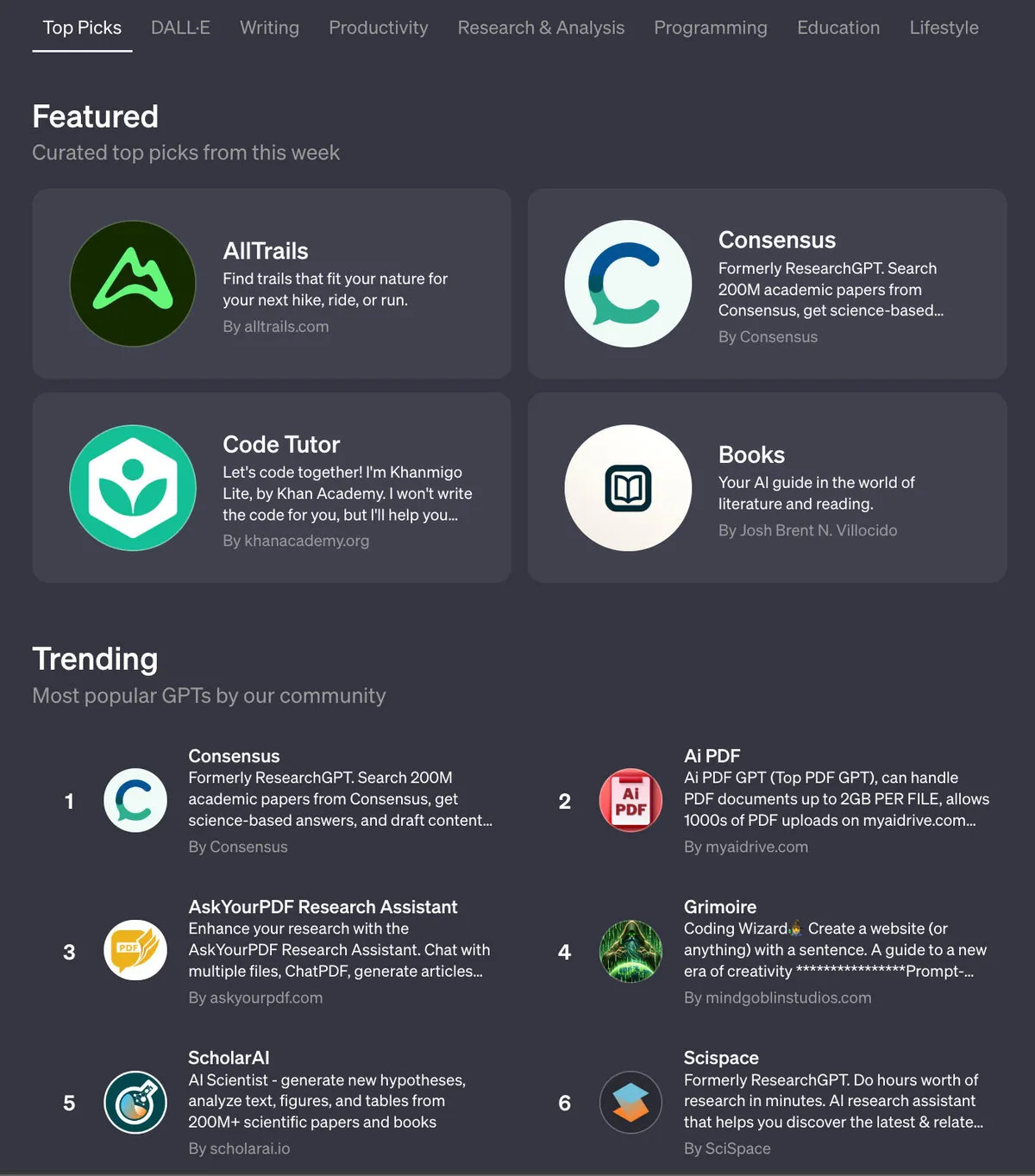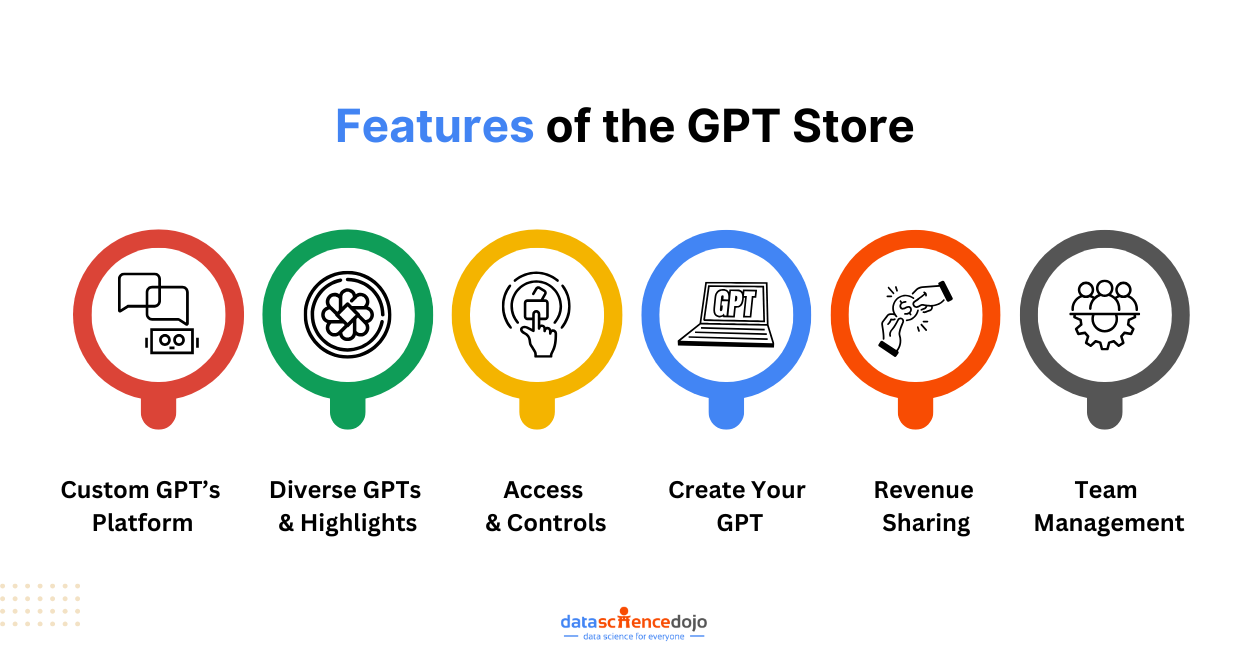GPTs for Data science are the next step towards innovation in various data-related tasks. These are platforms that integrate the field of data analytics with artificial intelligence (AI) and machine learning (ML) solutions. OpenAI played a major role in increasing their accessibility with the launch of their GPT Store.
What is OpenAI’s GPT Store?
OpenAI’s GPT store operates like just another PlayStore or Apple Store, offering a list of applications for users. However, unlike the common app stores, this platform is focused on making AI-powered solutions more accessible to different community members.
The collection contains several custom and chat GPTs created by OpenAI and other community members. A wide range of applications deal with a variety of tasks, ranging from writing, E-learning, and SEO to medical advice, marketing, data analysis, and so much more.
The available models are categorized based on the types of tasks they can support, making it easier for users to explore the GPTs of their interest. However, our focus lies on exploring the GPTs for data science available on the platform. Before we dig deeper into options on the GPT store, let’s understand the concept of GPTs for data science.
What are GPTs for Data Science?
These refer to generative pre-trained transformers (GPTs) that focus on aiding with the data science workflows. The AI-powered assistants can be customized via prompt engineering to handle different data processes, provide insights, and perform specific data science tasks.
These GPTs are versatile and can process multimodal forms of data. Prompt engineering enables them to specialize in different data-handling tasks, like data preprocessing, visualization, statistical analysis, or forecasting.
GPTs for data science are useful in enhancing the accuracy and efficiency of complex analytical processes. Moreover, they can uncover new data insights and correlations that would go unnoticed otherwise. It makes them a very useful tool in the efficient handling of data science processes.
Now, that we understand the concept and role of GPTs in data science, we are ready to explore our list of top 8.
8 Best GPTs for Data Science on OpenAI’s Store
Since data is a crucial element for the success of modern-day businesses, we must navigate the available AI tools that support data-handling processes. Since GPTs for data science enhance data processing and its subsequent results, they are a fundamental tool for the success of enterprises.
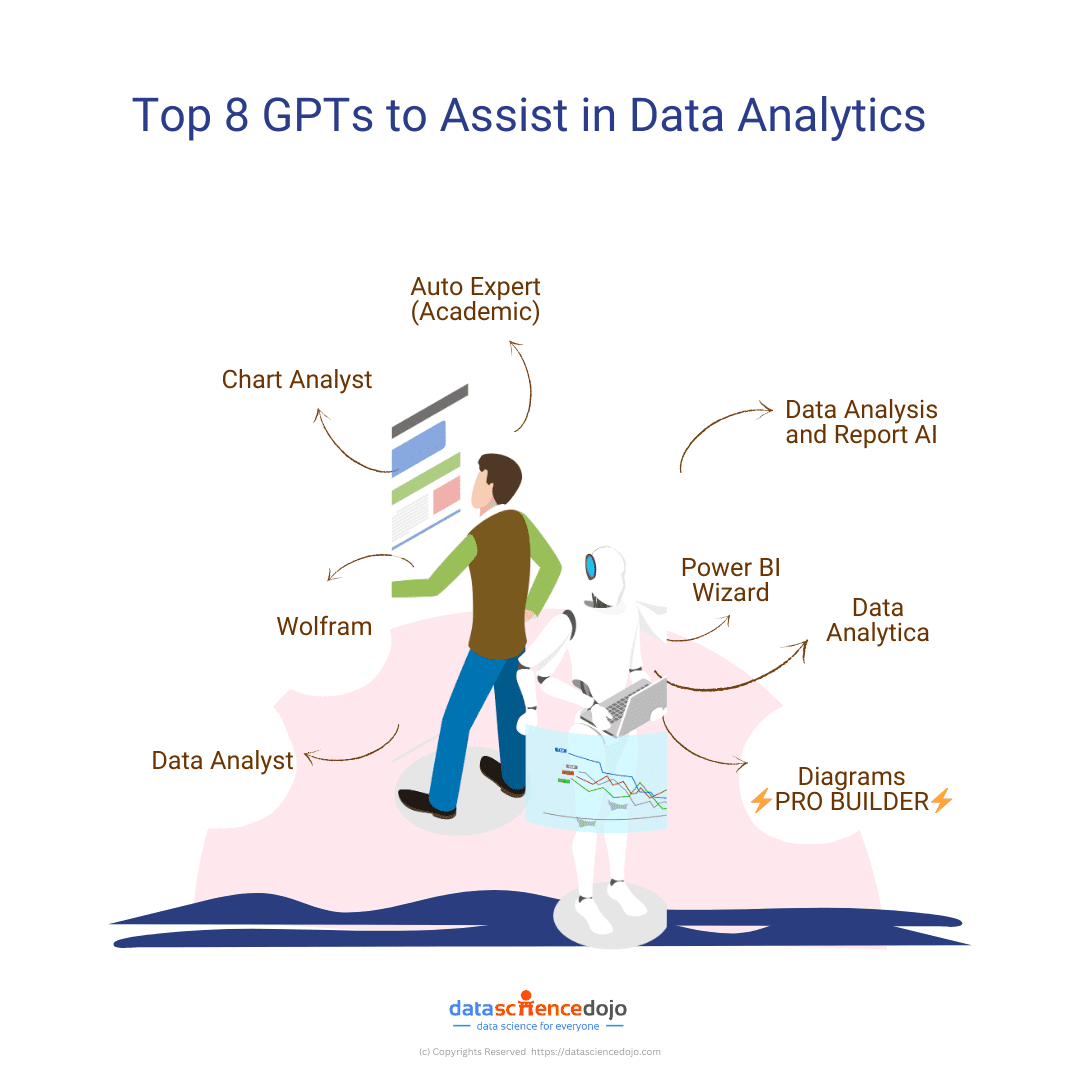
From the GPT store of OpenAI, below is a list of the 8 most popular GPTs for data science for you to explore.
Data Analyst
Data Analyst is a featured GPT in the store that specializes in data analysis and visualization. You can upload your data files to this GPT that it can then analyze. Once you provide relevant prompts of focus to the GPT, it can generate appropriate data visuals based on the information from the uploaded files.
This custom GPT is created by Open AI’s ChatGPT. It is capable of writing and running Python codes. Other than the advanced data analysis, it can also deal with image conversions.
Auto Expert (Academic)
The Auto Expert GPT deals with the academic side of data. It performs its function as an academic data assistant that excels at handling research papers. You can upload a research paper of your interest to the GPT and it can provide you with a detailed analysis.
The results will include information on a research paper’s authors, methodology, key findings, and relevance. It can also critique a literary work and identify open questions within the paper. Moreover, it also allows you to search for papers and filter through the list. This GPT is created by LLM Imagineers.
Wolfram
It is not a single GPT, but an integration of ChatGPT and Wolfram Alpha. The latter was developed by Wolfram Research and aims to enhance the functionality of ChatGPT. While language generation is the expertise of ChatGPT, Wolfram GPT provides computational capabilities and real-time data access.
It enables the integrated GPT for data science to handle powerful calculations, provide curated knowledge and insights, and share data visualizations. Hence, it uses structured data to enhance data-driven capabilities and knowledge access.
Diagrams ⚡PRO BUILDER⚡
The Diagrams Pro Builder excels at visualizing codes and databases. It is capable of understanding complex relationships in data and creating visual outputs in the form of flowcharts, charts, and sequences. Other outputs include database diagrams and code visualizations. It aims to provide a clear and concise representation of data.
Power BI Wizard
It is a popular business intelligence tool that empowers you to explore data. The data exploration allows you to create reports, use DAX formulas for data manipulation, and suggest best practices for data modeling. The learning assistance provides deeper insights and improved accuracy.
Chart Analyst
It is yet another form of data science that is used for academic purposes. You need to paste or upload your chart with as many indicators as needed. Chart Analysis analyzes the chart to identify patterns within the data and assist in making informed decisions. It works for various charts, including bar graphs, scatterplots, and line graphs.
Data Analysis and Report AI
The GPT uses AI tools for data analysis and report generation. It uses machine learning and natural language processing for automation and enhancement of data analytical processes. It allows you to carry out advanced data exploration, predictive modeling, and automated report creation.
Data Analytica
It serves as a broader category in the GPT store. It comprises of multiple GPTs for data science with unique strengths to handle different data-handling processes. Data cleaning, statistical analysis, and model evaluation are some of the major services provided by Data Analytica.
Following is a list of GPTs included under the category of Data Analytica:
- H2o Driverless AI GPT – it assists in deploying machine learning (ML) models without coding
- Amazon SageMaker GPT – allows the building, training, and deployment of ML models on Amazon Web Services
- Data Robot GPT – helps in the choice and tuning of ML models
This concludes the list of the best 10 GPTs for data science options available to cater to your data-handling needs. However, you need to take into account some other details before you make your choice of an appropriate tool from the GPT store.
Key Factors in Choosing a GPT for Data Science
It is not only about the available choices available in the GPT store. There are several other factors to consider before you can finalize your decision. Here are a few factors to understand before you choose a GPT for data science for your use.
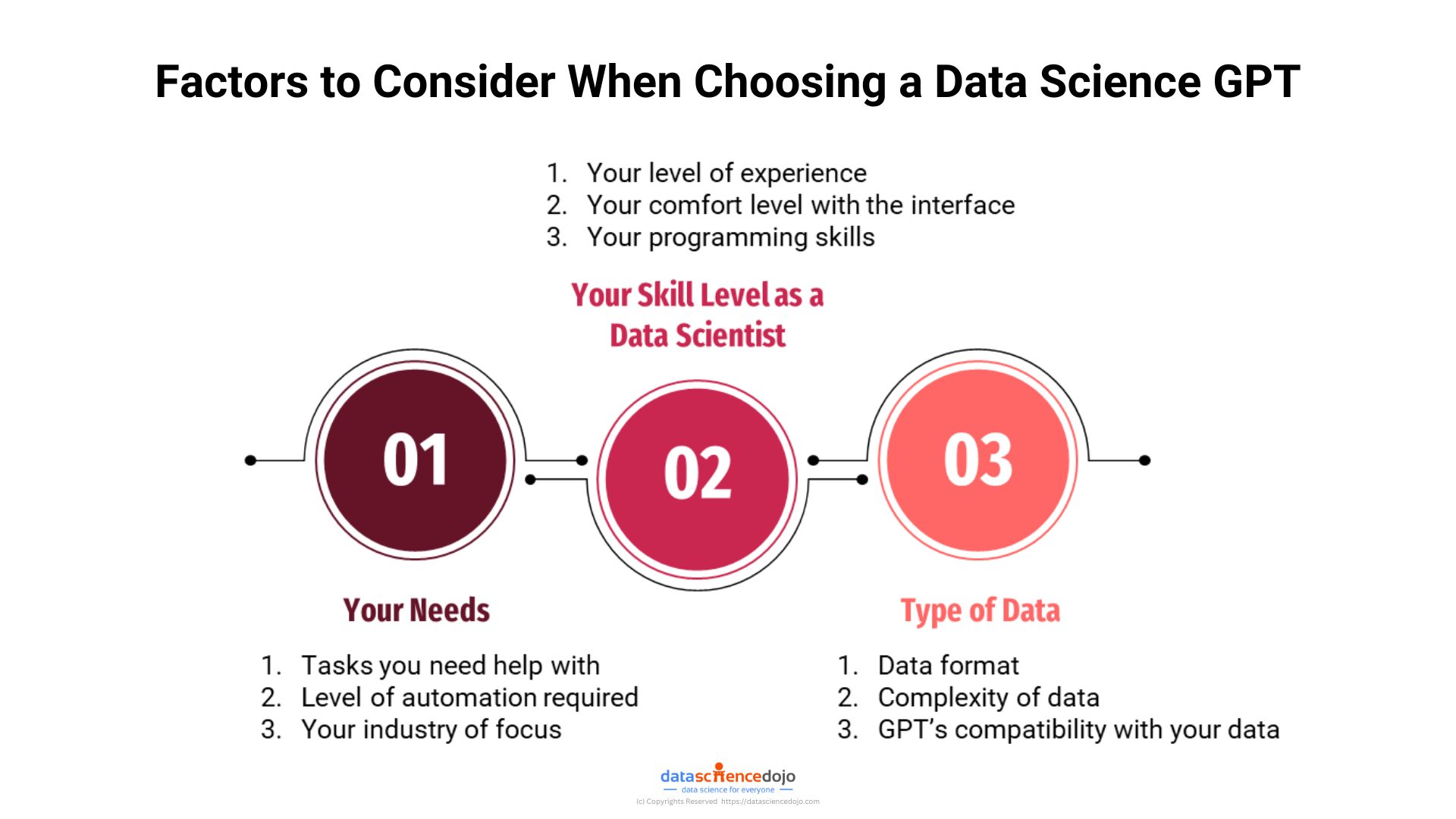
Your Needs
It refers to both your requirements and those of the industry you operate in. You must be clear about the data-handling tasks you want to perform with your GPT tool. It can range from simple data cleaning and visualization to getting as complex as model building.
It is also important to acknowledge your industry of operation to ensure you select a relevant GPT for data science. You cannot use a GPT focused on healthcare within the field of finance. Moreover, you must consider the acceptable level of automation you require in your data processing.
Your Skill Level as a Data Scientist
A clear idea of your data science skills will be critical in your choice of a GPT. If you are using a developer or an entire development team, you must also assess their expertise before deciding as different GPTs require different levels of experience.
Some common aspects to understand include your comfort level with programming and requirements from the GPT interface. Both areas will be addressed through your level of skills as a data scientist. Hence, these are all related conditions to consider.
Type of Data
While your requirements and skill levels are crucial aspects to consider, your data does not become less important in the process. Since a GPT for data science has to deal with data, you must understand the specifics of your information to ensure the selected tool provides the needed solutions.
Format of your data is of foremost importance as different tools handle textual, video, or audio inputs differently. Moreover, you must understand the complexity of your data and its compatibility with the GPT.
These are some of the most significant factors to consider when making your choice.
The Last Tip…
Now you are fully equipped with the needed information and are ready to take your pick. While you understand the different available sources in the market and important factors to consider, you must remember that a GPT for data science is just a tool to assist you in the process.
Your data science skills are still valuable and you must focus on improving them. It will help you engage better with these tools and use them to their full potential. So use these tools for work, but always trust your human skills.



